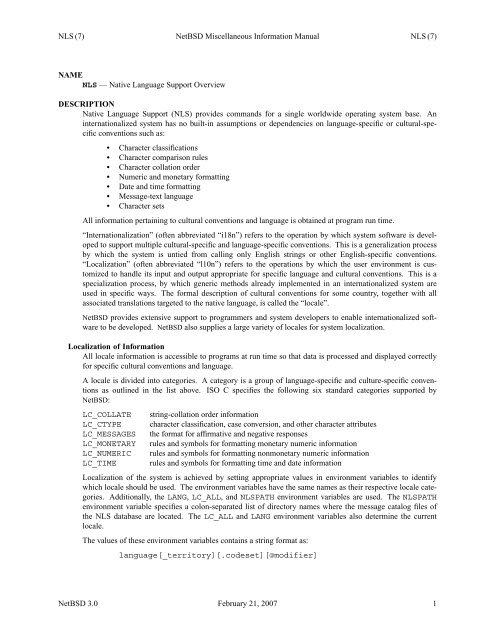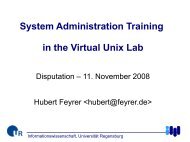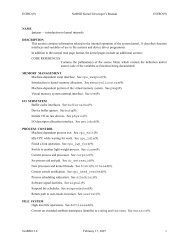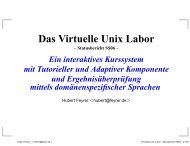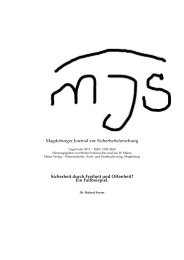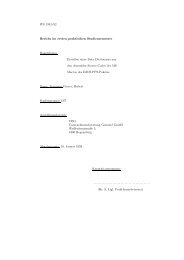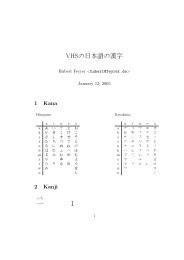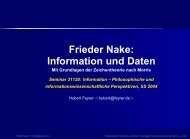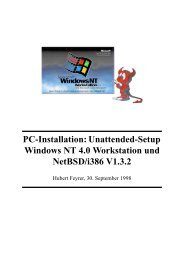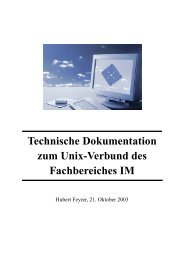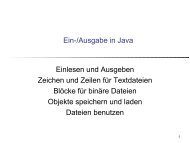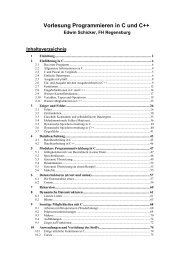INTRO (7) NetBSD Miscellaneous Information Manual INTRO (7 ...
INTRO (7) NetBSD Miscellaneous Information Manual INTRO (7 ...
INTRO (7) NetBSD Miscellaneous Information Manual INTRO (7 ...
You also want an ePaper? Increase the reach of your titles
YUMPU automatically turns print PDFs into web optimized ePapers that Google loves.
NLS (7) <strong>NetBSD</strong> <strong>Miscellaneous</strong> <strong>Information</strong> <strong>Manual</strong> NLS (7)<br />
NAME<br />
NLS —Native Language Support Overview<br />
DESCRIPTION<br />
Native Language Support (NLS) provides commands for a single worldwide operating system base. An<br />
internationalized system has no built-in assumptions or dependencies on language-specific or cultural-specific<br />
conventions such as:<br />
• Character classifications<br />
• Character comparison rules<br />
• Character collation order<br />
• Numeric and monetary formatting<br />
• Date and time formatting<br />
• Message-text language<br />
• Character sets<br />
All information pertaining to cultural conventions and language is obtained at program run time.<br />
“Internationalization” (often abbreviated “i18n”) refers to the operation by which system software is developed<br />
to support multiple cultural-specific and language-specific conventions. This is a generalization process<br />
by which the system is untied from calling only English strings or other English-specific conventions.<br />
“Localization” (often abbreviated “l10n”) refers to the operations by which the user environment is customized<br />
to handle its input and output appropriate for specific language and cultural conventions. This is a<br />
specialization process, by which generic methods already implemented in an internationalized system are<br />
used in specific ways. The formal description of cultural conventions for some country, together with all<br />
associated translations targeted to the native language, is called the “locale”.<br />
<strong>NetBSD</strong> provides extensive support to programmers and system developers to enable internationalized software<br />
to be developed. <strong>NetBSD</strong> also supplies a large variety of locales for system localization.<br />
Localization of <strong>Information</strong><br />
All locale information is accessible to programs at run time so that data is processed and displayed correctly<br />
for specific cultural conventions and language.<br />
Alocale is divided into categories. A category is a group of language-specific and culture-specific conventions<br />
as outlined in the list above. ISO C specifies the following six standard categories supported by<br />
<strong>NetBSD</strong>:<br />
LC_COLLATE<br />
LC_CTYPE<br />
LC_MESSAGES<br />
LC_MONETARY<br />
LC_NUMERIC<br />
LC_TIME<br />
string-collation order information<br />
character classification, case conversion, and other character attributes<br />
the format for affirmative and negative responses<br />
rules and symbols for formatting monetary numeric information<br />
rules and symbols for formatting nonmonetary numeric information<br />
rules and symbols for formatting time and date information<br />
Localization of the system is achieved bysetting appropriate values in environment variables to identify<br />
which locale should be used. The environment variables have the same names as their respective locale categories.<br />
Additionally, the LANG, LC_ALL, and NLSPATH environment variables are used. The NLSPATH<br />
environment variable specifies a colon-separated list of directory names where the message catalog files of<br />
the NLS database are located. The LC_ALL and LANG environment variables also determine the current<br />
locale.<br />
The values of these environment variables contains a string format as:<br />
language[_territory][.codeset][@modifier]<br />
<strong>NetBSD</strong> 3.0 February 21, 2007 1


